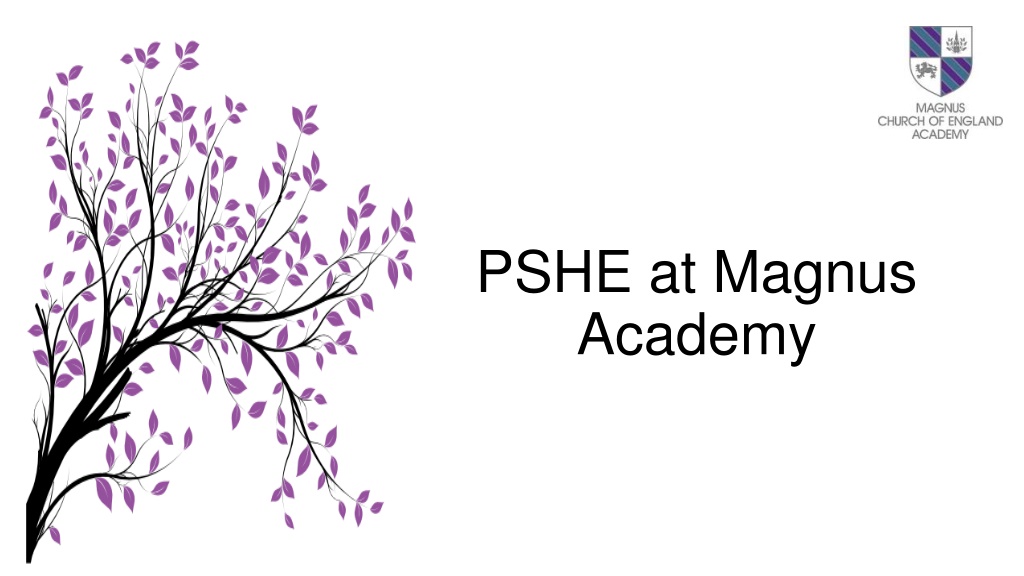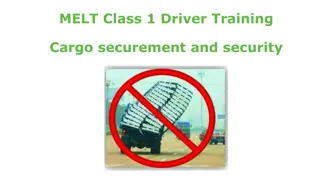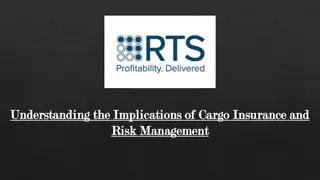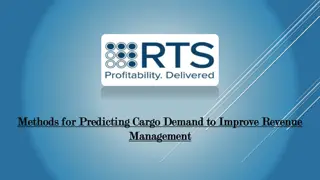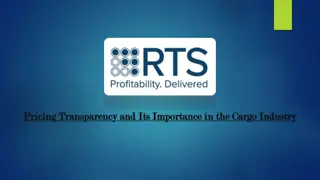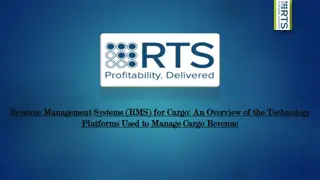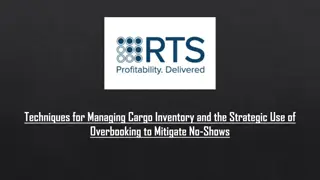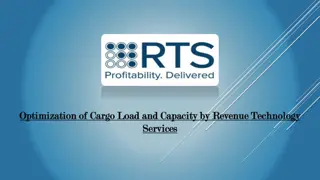Cargo Handling and Storage Essentials
Dive into the crucial aspects of cargo handling and storage operations, covering topics like space calculation, documentation flow, stock protection, and more. Learn about good practices, equipment, stacking methods, and avoid common pitfalls in the logistics sector.
Download Presentation

Please find below an Image/Link to download the presentation.
The content on the website is provided AS IS for your information and personal use only. It may not be sold, licensed, or shared on other websites without obtaining consent from the author.If you encounter any issues during the download, it is possible that the publisher has removed the file from their server.
You are allowed to download the files provided on this website for personal or commercial use, subject to the condition that they are used lawfully. All files are the property of their respective owners.
The content on the website is provided AS IS for your information and personal use only. It may not be sold, licensed, or shared on other websites without obtaining consent from the author.
E N D
Presentation Transcript
PSHE at Magnus Academy
What is PSHE? PSHE Personal, Social, Health, Economics Education Personal to do with ourselves Social to do with our Interactions and relationships with others Health all about looking after our bodies, mentally and physically Economics all about managing our money
Why study PSHE? It allows students to gain knowledge and understanding of how to manage their lives now and in the future It gives students a platform to discuss and explore issues and challenges that they face on a day to day basis in a safe and secure environment
Why study PSHE? It allows students to make informed choices to help them stay healthy and safe in today s society. It fulfils the schools obligation to encourage the spiritual, moral, cultural, mental and physical development of pupils.
Objectives We want to: Explain our requirements for RSE Explain how we currently teach RSE, and get your views on how well this curriculum works. Get your views on what you think our RSE curriculum should cover Explain how we ll develop our updated curriculum.
Why is PSHE/RSE so important? The following slides show several statistical data of issues students are faced with daily that PSHE hopes to address and empower students to deal with.
Why is PSHE/RSE so important? 1 in 3 adult mental health conditions relate directly to adverse childhood experiences https://youngminds.org.uk/about-us/media- centre/mental-health-stats/ 96% of gay pupils hear homophobic remarks such as poof or lezza used in school. Almost all (99%) hear phrases such as that s so gay or you re so gay in school https://www.stonewall.org.uk/documents/sc hool_report_2012%282%29.pdf
Why is PSHE/RSE so important? More than 16,000 young people are absent from school because of bullying. http://redballoonlearner.co.uk/includes/files /resources/261298927_r_ed-balloon-natcen- research-report.pdf 60% of 13 to 18 year olds have been asked for a sexual image or video of themselves http://www.nspcc.org.uk/globalassets/docu ments/annual-reports/childline-review- under-pressure.pdf
Why is PSHE/RSE so important? More than 1 in 7 surveyed children aged 11 18 (15%) say they have been asked to send self-generated images and sexual messages NSPCC (2018) NetAware research on file with the NSPCC 7 in 10 young people aged between 13 and 22 have been a victim of cyberbullying http://www.ditchtehlabel.org/downloads/th e-annual-cyberbullying-survey-2013.pdf
What are the RSE requirements? We must provide the following to all pupils: Relationships and Sex Education Health education
What does our curriculum look like now? What are your thoughts on our current curriculum for RSE and personal, social, health and economic (PSHE) education? Do you think this curriculum meets your child s needs? What do we do well? What could we do better? Is there anything we re not covering that you think we need to address? Is there something we could cover more/less? What do you think about the way we currently deliver RSE to pupils? As a parent, do you feel like you need more information or guidance on specific topics?
What does our curriculum look like now?
What does our curriculum look like now?
What does our curriculum look like now?
What does our curriculum look like now?
What does our curriculum look like now?
RSE Year 7 RSE Introduction to Puberty Introduction to consent 3. Puberty 1. 2. 4. FGM 5. Menstruation Wellbeing 6. Toxic Masculinity
RSE Year 8 RSE 1. Sexual orientation and Gender Identify Healthy and unhealthy relationships 3. LGBTQi+ 2. 4. Consent avoiding assumptions Introduction to contraception 5.
RSE Year 9 RSE FGM and the Law Freedom and capacity to consent Role of intimacy and pleasure 1. 2. 3. 4. Contraception 5. Managing the end of relationships
RSE RSE Year 10 FGM and the Law Impact of pornography 3. Love and abuse Pressure, persuasion and coercion 5. Sexualisation and the media 1. 2. 4.
RSE Year 11 RSE Alcohol and Bad Choices Importance of Sexual Health Revisiting Contraception 1. 2. 3. Revisiting STI s Respect and Relationships Fertility and what impacts it 4. 5. 6.
What happens next? We re also getting feedback from: Staff Pupils Governors Once we ve considered all the feedback, we ll draft an updated RSE policy, which will set out our proposed curriculum. There will be a formal consultation period before the updated policy is approved. Explain how the policy consultation will work. For instance: We ll post the draft policy on our website, and send you an email letting you know how you can feed back
